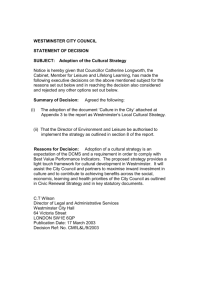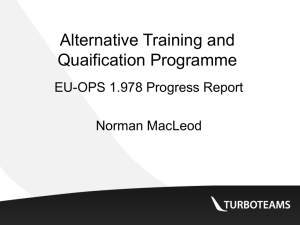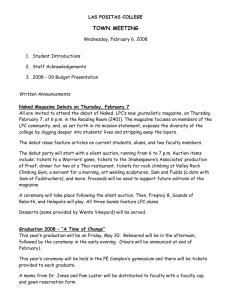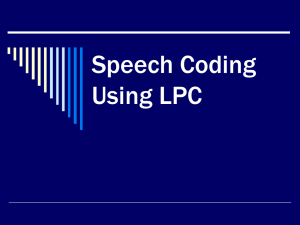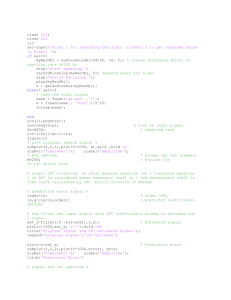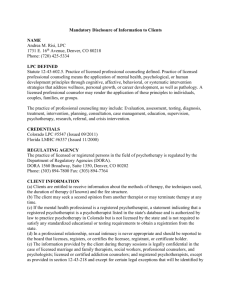Profile (PDF 159K) - Solicitors Regulation Authority
advertisement
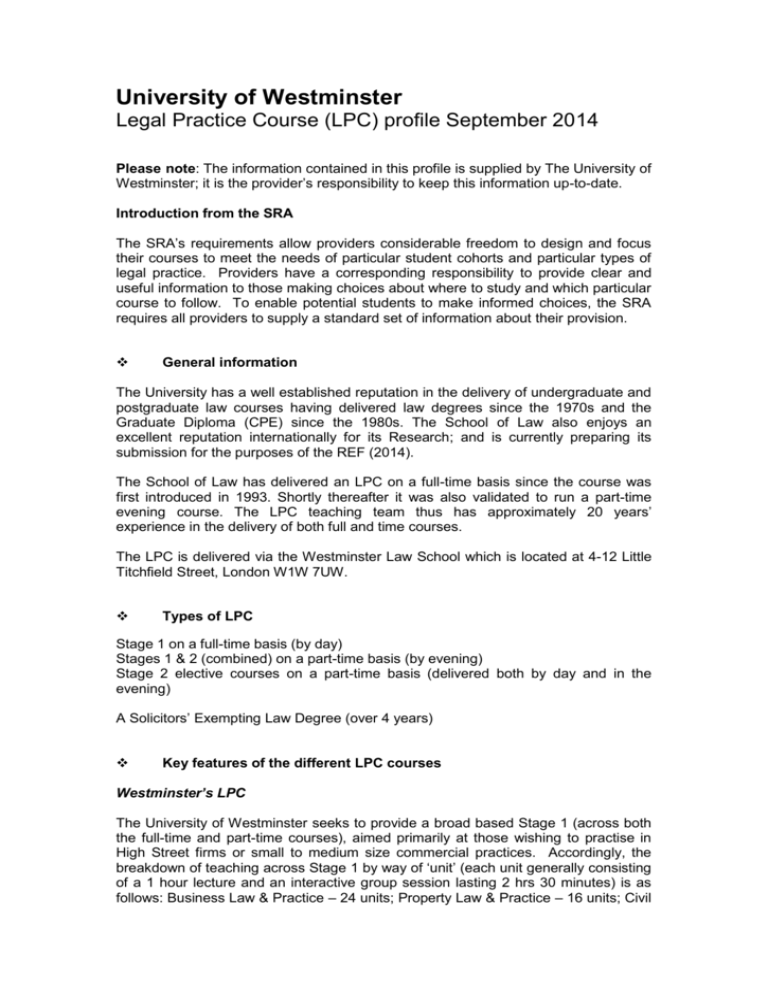
University of Westminster Legal Practice Course (LPC) profile September 2014 Please note: The information contained in this profile is supplied by The University of Westminster; it is the provider‟s responsibility to keep this information up-to-date. Introduction from the SRA The SRA‟s requirements allow providers considerable freedom to design and focus their courses to meet the needs of particular student cohorts and particular types of legal practice. Providers have a corresponding responsibility to provide clear and useful information to those making choices about where to study and which particular course to follow. To enable potential students to make informed choices, the SRA requires all providers to supply a standard set of information about their provision. General information The University has a well established reputation in the delivery of undergraduate and postgraduate law courses having delivered law degrees since the 1970s and the Graduate Diploma (CPE) since the 1980s. The School of Law also enjoys an excellent reputation internationally for its Research; and is currently preparing its submission for the purposes of the REF (2014). The School of Law has delivered an LPC on a full-time basis since the course was first introduced in 1993. Shortly thereafter it was also validated to run a part-time evening course. The LPC teaching team thus has approximately 20 years‟ experience in the delivery of both full and time courses. The LPC is delivered via the Westminster Law School which is located at 4-12 Little Titchfield Street, London W1W 7UW. Types of LPC Stage 1 on a full-time basis (by day) Stages 1 & 2 (combined) on a part-time basis (by evening) Stage 2 elective courses on a part-time basis (delivered both by day and in the evening) A Solicitors‟ Exempting Law Degree (over 4 years) Key features of the different LPC courses Westminster’s LPC The University of Westminster seeks to provide a broad based Stage 1 (across both the full-time and part-time courses), aimed primarily at those wishing to practise in High Street firms or small to medium size commercial practices. Accordingly, the breakdown of teaching across Stage 1 by way of „unit‟ (each unit generally consisting of a 1 hour lecture and an interactive group session lasting 2 hrs 30 minutes) is as follows: Business Law & Practice – 24 units; Property Law & Practice – 16 units; Civil Litigation – 15 units; Criminal Litigation – 10 units; and Wills & Administration – 6 units. Stage 1 lectures will be delivered by means of both „live‟ weekly delivery and in some cases by pre-recorded delivery which can be accessed from home via the University‟s intranet (Blackboard). As explained below, emphasis will continue to be given to the personal nature of the student‟s experience while on the course by means of the „live‟ lectures given to the whole cohort and the relatively small number of students attending any one group session. Stage 1 on the full-time course will be delivered across 22 weeks from the beginning of September 2014 to the end of January 2015. Assessments will then be concluded during the course of February 2015 with Stage 2 electives (each one including 11 units), being delivered thereafter. Teaching of Stage 2 electives will continue until the end of May 2015 with assessments being concluded by the end of June 2015. Full-time students can expect to attend on up to 4 full days a week during September 2014 (when the Foundation Course is delivered); thereafter, as a general rule, students can expect to be attending sessions 3 days a week (generally Mondays, Tuesdays and Thursdays), although attendance may be required on alternative/additional days, for example, where skills assessments or mock exams are being held. Delivery of Stages 1 & 2 (combined) on the part-time course is spread across 2 years. A student starting Stage 1 in September 2014 will study Property, Litigation and Accounts (together with various course skills), with one Stage 2 elective studied towards the end of Year 1. The student will start Year 2 in September 2015 and complete Stage 1 studies in Business Law & Practice and Wills & Administration the following January. The student will finish Year 2 by studying two further Stage 2 electives. As a general rule, part-time students can expect to attend on 2 evenings a week (i.e. 2 out of Tuesday/Wednesday/Thursday), although attendance on 3 evenings may be required in some weeks. Students should also note that the particular evenings they are expected to attend will vary across the 2 years‟ duration of the course and that classes will start at 5.45pm and where a 'live' lecture is being delivery, will generally finish at approximately 9pm. Solicitors’ Exempting Law Degree The Westminster Law School launched its solicitors‟ exempting law degree - which brings together the best elements of the LPC and the LLB – for the first time in 2009. Over the four years of the course, students benefit from an integrated approach to their learning under which they will combine their study of skills, academic and vocational subjects. Practical modules therefore run throughout the spine of the course. Indeed, all students gain experience of real life disputes and transactions by undertaking a compulsory clinical module in Years 3 & 4 of the course. This underpins and enlivens their understanding of the law. It therefore helps students with the other modules that they study and provides the sort of practical experience that future employers are looking for. Maximum number of students in the different types of teaching and learning sessions Westminster’s LPC We are pleased to note that students studying the LPC at Westminster have previously expressed the view that one of the most attractive features of our course is the fact that we teach to a relatively small number of students. It is felt that this has contributed to a „more personal learning experience‟. (See Maximum Numbers below.) While the exact number of students attending lectures or group sessions will inevitably depend on the numbers recruited onto the course for September 2014, we would expect lectures to be attended by 60 to 80 persons (i.e. 80 would be the maximum number we would expect to recruit on the full-time course) with group sessions (both full-time and part-time) attended on average by approximately 16 students. Solicitors’ Exempting Law Degree On the exempting degree, there are no more than 20 students in a small group session and the groups are usually smaller than this. Numbers in the lectures will vary according to the subject that is being taught. Predominantly, the small group sessions are run specifically for exempting degree students which means that they will benefit from the sort of personal learning experience that is a strong feature of the LPC at Westminster. Maximum number of students it will recruit onto each course Westminster’s LPC Under the existing course provision, Westminster is validated to deliver its full-time course to up to 120 students and its part-time course to up to 128 students (i.e. up to 64 students in each of Year 1 and Year 2). (By way of illustration, for September 2013, we recruited 55 onto the full-time and 40 onto the part-time. (Numbers enrolled as of 7/10/13.)) Given our desire to maintain a close working relationship between tutors and individual students, it is very much our expectation that we will deliver the course to similar numbers in September 2014. NB. The availability of Westminster’s Stage 2 electives may be affected by the size of the cohort for any one year. Solicitors’ Exempting Law Degree The numbers on the exempting degree are limited to 60 students. This allows us to give students plenty of individual attention. Entry requirements Westminster’s LPC Each student must satisfy the following requirements prior to commencing the LPC: A qualifying law degree (2.2 and above) or a GDL/CPE (with equivalent grades) or similar qualification such as ILEX Applicants must have a sufficient command of English to successfully complete the course Enrolled as a student member of Solicitors Regulation Authority Obtained a Certificate of Completion of the Academic Stage of Training from the Solicitors Regulation Authority Solicitors’ Exempting Law Degree Three A levels (A2) at grades ABB; other Curriculum 2000 combinations will be considered on an individual basis; six GCSEs at grade C or above, including English and mathematics. Equivalent qualifications will also be considered. We take the whole application into consideration. We look for consistent academic records from GCSE onwards and carefully consider work experience, reference(s), personal statement and motivation to study. Policy on Stages 1 and 2 Westminster’s LPC We will of course give careful consideration to an application made by a student who initially opts to do Stage 1 only with us (full-time), but who subsequently wishes to remain at Westminster with a view to doing one or more Stage 2 electives. Likewise, we will give careful consideration to any application made by a student who, having previously studied Stage 1 at another LPC provider, subsequently wishes to study one or more Stage 2 electives at Westminster. Solicitors’ Exempting Law Degree - Entry and Exit points Students must enrol for the LL.B. (Solicitors Exempting) degree at the beginning of their first year at University. Because of the unusual and integrated nature of the programme, it is unlikely that students will be able to transfer into second or subsequent years. However, this may be possible if they have successfully completed whole years at institutions with a similarly structured degree, or where they have experience that is accepted as an adequate alternative to the Legal Ethics, Methods and Skills modules. Students may leave the LL.B. (Solicitors Exempting) degree at the end of the first, second or third year at University. If they do so they may be eligible to transfer to other courses within the School or for an interim award depending on the number of credit points they have acquired. Academic qualification that will be awarded to successful students Westminster’s LPC Students who successfully complete both Stages 1 and 2 (in full) at Westminster will be awarded the Postgraduate Diploma in Legal Practice. The University would consider applications for accreditation of either subsequent or prior learning in deciding whether to award the Diploma to a student who had completed either Stage 1 or Stage 2 in its entirety with the University. Solicitors’ Exempting Law Degree On the exempting degree, students will receive an award which reflects the integrated nature of the course. On completion, students will therefore be awarded an LL.B. (Solicitors Exempting) with honours with a classification in respect of degree elements and a Practice Distinction or Merit, if appropriate, in respect of the Legal Practice Course elements. Learning resources available to support the course including library and IT provision Westminster’s LPC Students are provided with a full set of course materials together with recommended textbooks (which may be OUP or CLP publications), at the start of the course. Extensive use is made of PowerPoint in both lectures and group sessions while the student‟s learning experience is further enhanced by the provision of interactive Smartboards in the group session teaching rooms. Extensive use is made of Blackboard (which can be easily accessed via the University‟s website), on which tutors routinely post Session Handouts, Computer Assisted Learning (CAL) exercises and the pre-recorded Camtasia lectures. Students are also kept regularly informed of relevant LPC events/results etc. via Blackboard. Students can also access the School‟s legal database allowing online access to resources such as Halsbury‟s Statutes, Westlaw and Lawtel. Solicitors’ Exempting Law Degree With the exception of the textbooks – which are not provided - students will be able to take advantage of the same facilities that are available to LPC students. Percentage of teaching staff who are qualified as solicitors or barristers Westminster’s LPC Each of the LPC tutors is either a qualified solicitor or barrister ie. 100% are professionally qualified in one capacity or another. In the case of the LPC Pro-Bono scheme/Clinical Elective, the relevant tutors also hold practising certificates. The student‟s experience is further enhanced as a result of some classes being delivered by experienced practitioners who teach in conjunction with the permanent members of the teaching team. Solicitors’ Exempting Law Degree Tutors on the exempting degree will have the appropriate qualification for the module that they are teaching. On the vocational modules all tutors will either be solicitors or barristers. Tutors on the Clinical Education modules will also hold current practising certificates. Tutors on the academic modules will have qualifications that are relevant to the area of study. Percentage of teaching staff with higher level teaching qualification Westminster’s LPC Westminster‟s LPC students have consistently graded our Teaching (via our QA Feedback Forms) as either Excellent or Good; however, the majority of our LPC teaching team do not hold a higher level teaching qualification (PGCHE). Solicitors’ Exempting Law Degree The majority of the vocational module tutors on the Exempting Degree are existing LPC tutors and therefore the same comments made in relation to the LPC apply. All tutors are experienced law lecturers. Teaching staff profile Westminster’s LPC A clear majority of Westminster‟s LPC teaching team has been in post for 10 years or more and thus possess a wealth of experience in designing and delivering the course to a high standard. Further, a number of our tutors have experience as external examiners for other LPC providers, while some are engaged in research. Applicants should also note that the course manual for Property Law and Practice, “A Practical Approach to Conveyancing” (OUP) was written by two members of the property team, Professor Robert Abbey and Mark Richards. They are also the authors of “A Practical Approach to Commercial Conveyancing and Property”. Solicitors’ Exempting Law Degree As the majority of the exempting degree vocational tutors are existing LPC tutors the same comments made in relation to the LPC again apply. Tutors on the academic modules are primarily LLB tutors many of whom have extensive teaching experience and are actively engaged in research of their relevant teaching areas. Fees Westminster’s LPC (FT) Stage 1 & 2 (September 2014 to June 2015). Fees: £11,500 (Domestic) (FT) Stage 1 & 2 (September 2014 to June 2015). Fees: £10,000 (Overseas) (FT) Stage 1 only (September 2014 to February 2015). Fees: £9,500 (FT) Stage 2 Fees: (3 electives: £3000) (2 electives: £2000) (1 elective:£1000) (PT) Stage 1 & 2 (Two academic years: 2014-2016) Fees: £5750 per academic year Fees and Discount(s) NB. FT Applicants only: An „early payment discount‟ is also given (currently set at 1.5%) if the relevant course fee for Stage 1 (only) or Stages 1 & 2 (in full) is paid in full by [the published date] in September 2014. NB. Part-time students do not qualify for the 1.5% discount (above) even if the course fee for the year is paid in full by [the published date] in September 2014. NB. Westminster LLB or GDL students may be eligible for a 15% discount on the published fee (above) for domestic students. NB. Part-time tuition fees are per annum and are likely to increase in line with inflation from one year to the next. Tuition fees are inclusive of all course materials and books. All applicants who accept an offer to study the LPC with the University of Westminster are required to pay an SRA holding deposit of £120 in addition to the yearly tuition fees. NB. BTVC students with exemptions are invited to contact the LPC Administrator (details below) for further information concerning the course fee. Solicitors’ Exempting Law Degree UK Home or EU students: £9,000 per academic year (September 2014) Full-time overseas students: £11,750 per academic year (September 2014) Pastoral support, including dedicated careers guidance staff Westminster’s LPC Students are assigned to a member of the LPC teaching team who acts as the individual‟s personal tutor throughout the academic year. A number of formal points of contact are scheduled throughout the year (for example, early on in the course, following the release of assessment results etc.), while students are further encouraged to seek one to one meetings with their personal tutor whenever necessary. In addition to developing a good relationship with the personal tutor, it is our belief that across the academic year, students will in fact also develop a good relationship with members of the teaching team generally (including our dedicated LPC Administration team). Certainly, we are confident that there will always be someone there to advise you at short notice at times of need. With regards to our LPC careers provision, workshops are arranged with the University‟s student employment advisor at an early stage during the course. Students are encouraged to focus on the need to contact prospective employers during the course and in doing so are supported by two members of the LPC teaching team who provide one to one advice concerning CVs and interview technique. A number of practitioner led careers talks are also usually held from time to time during the year. Solicitors’ Exempting Law Degree As with the LPC, all students are assigned to a personal tutor. The system will differ from that employed on the LPC, however, given that the two courses are quite different. In common with the LPC, however, there is an open door policy and students should always be able to find someone who can help them. In terms of careers, employability is a major theme of the exempting degree and students will be given plenty of guidance during their years on the course. For further information, please contact the provider direct: Westminster’s LPC Website: Email: Contact name: Telephone: www.westminster.ac.uk/lpc lpcadmin@wmin.ac.uk (FT & PT) Miles Macleod 0207-911-5017 Exempting Law Degree Website: Email: Contact Name: Telephone: www.wmin.ac.uk J.Dymott@westminster.ac.uk Jochim Dymott, Exempting Law Degree Course Leader 0207- 911 5000 x2522
